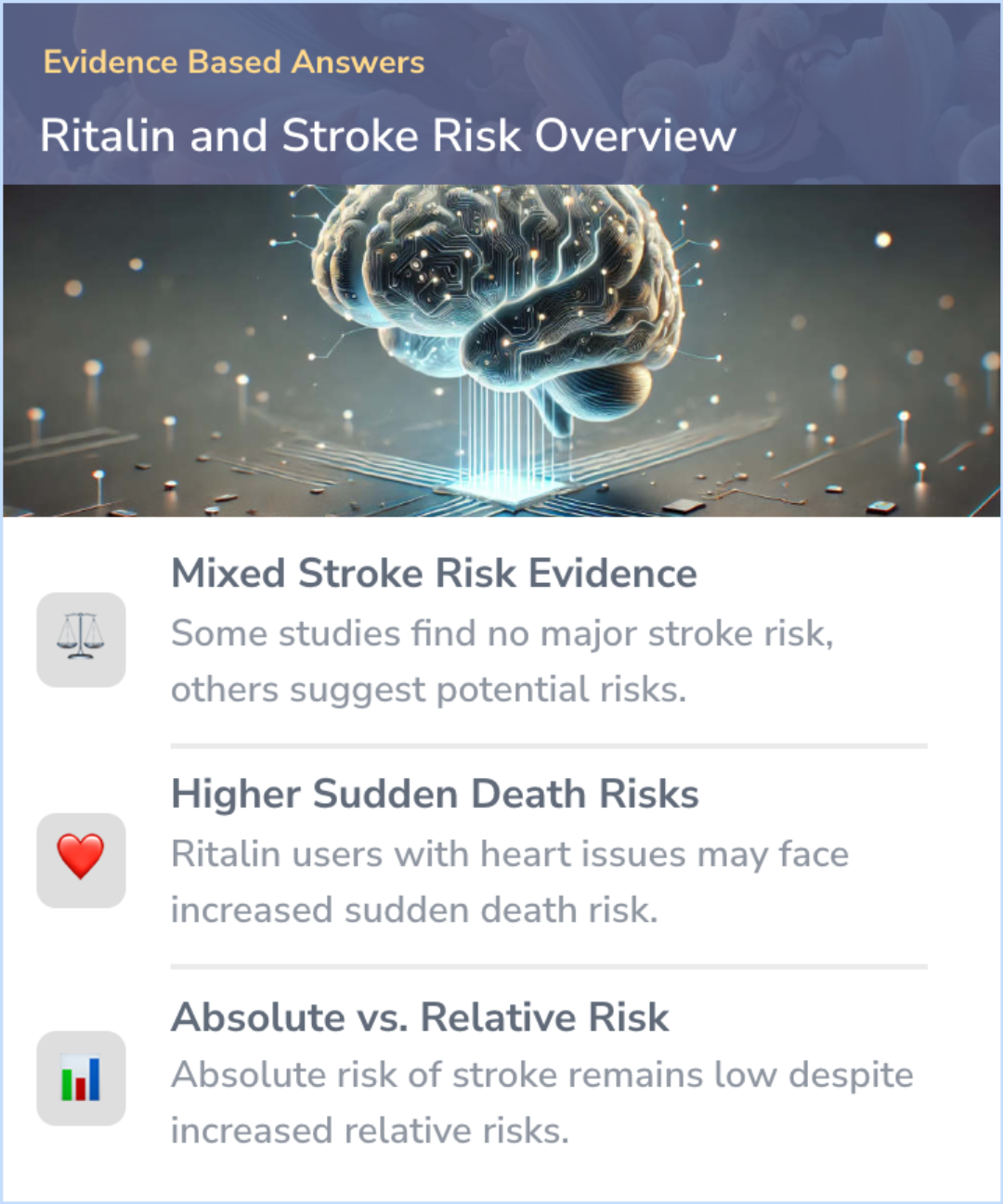Ritalin
Evidence Based Answers
Does Ritalin increase stroke risk?
Research on Ritalin and stroke risk shows mixed results, with higher risks for those with heart conditions, though absolute stroke risk for most remains low.
Published: November 8, 2024
Click to explore a section:

Mixed stroke risk findings for Ritalin users; higher risks for heart conditions.
Background: Stroke and Heart Risk
Adults may face increased risks of stroke or heart attack when using stimulants like Ritalin. This stimulant can also lead to elevated blood pressure and heart rate, factors that might contribute to these risks in certain individuals.
It's important to watch for symptoms such as chest pain or fainting while on stimulants, as these could indicate serious heart-related effects. Immediate medical evaluation is advised if such symptoms occur.
It's important to watch for symptoms such as chest pain or fainting while on stimulants, as these could indicate serious heart-related effects. Immediate medical evaluation is advised if such symptoms occur.
Background: Ritalin and Stroke Risk: Research Findings
Research has explored whether Ritalin increases the risk of stroke. Findings have been mixed, with some studies showing no major increase, while others suggest a possible connection, especially in individuals with pre-existing heart conditions.
The general population may face a minimal increase in absolute risk, but individuals with certain heart conditions should discuss their risks with healthcare providers.
The general population may face a minimal increase in absolute risk, but individuals with certain heart conditions should discuss their risks with healthcare providers.
“
Source Quotes:
While Habel et al. (2011) found no evidence for increased risk of myocardial infarction (MI), sudden cardiac death (SCD), or stroke, a corresponding trial by Schelleman et al. (2012) reported significantly higher rates of SCD/ventricular arrhythmias and stroke in a sample of patients treated with MPH.
Sudden death, stroke, and myocardial infarction have been reported in adults taking stimulant drugs at usual doses for ADHD.
Background: Identifying Higher Sudden Death Risks with Ritalin
Some people may have a higher risk of sudden death when using Ritalin, particularly those with structural heart defects or congenital heart disease. There have been reports of sudden death and cardiovascular events in this group, highlighting the importance of medical assessment.
Individuals with a family history of sudden cardiac events or existing heart conditions should discuss potential risks with a healthcare provider.
Individuals with a family history of sudden cardiac events or existing heart conditions should discuss potential risks with a healthcare provider.
“
Source Quotes:
Sudden death has been reported in association with CNS stimulant treatment at usual doses in children and adolescents with structural cardiac abnormalities or other serious heart problems.
Stroke and myocardial infarction also have been observed in adults. Due to the risk of such fatal side effects, it is advisable to avoid methylphenidate in patients with a structural cardiac abnormality, cardiomyopathy, or arrhythmias.
Background: Understanding Absolute vs. Relative Risk with Ritalin
When looking at Ritalin’s potential risk for stroke, it helps to understand the difference between absolute and relative risk. Absolute risk shows the actual likelihood of an event, while relative risk compares it to others. Although there might be increases in heart events for some groups, the overall absolute risk can remain small.
People with higher heart risks may experience small changes in heart rate and blood pressure, but for many, the risk remains low.
People with higher heart risks may experience small changes in heart rate and blood pressure, but for many, the risk remains low.
“
Source Quotes:
However, the absolute risk increase (ARI) values were very small (0.2-0.4%).
Stimulant medications cause a modest increase in average blood pressure (about 2-4 mmHg) and average heart rate (about 3-6 bpm), and individuals may have larger increases.
Background: Managing Heart Health While Using Ritalin
For those taking Ritalin, keeping track of heart health is recommended. This includes checking heart rate and blood pressure and discussing potential risks with a doctor.
People with heart conditions or a family history of heart disease should make sure their healthcare provider is aware before starting Ritalin.
People with heart conditions or a family history of heart disease should make sure their healthcare provider is aware before starting Ritalin.
“
Source Quotes:
Children, adolescents, or adults who are being considered for treatment with stimulant medications should have a careful history (including assessment for a family history of sudden death or ventricular arrhythmia) and physical exam to assess for the presence of cardiac disease.
The main vitals to note at each visit are blood pressure and heart rate, especially in patients with underlying hypertension, heart failure, a recent MI, or ventricular arrhythmia, as slight elevations can occur with methylphenidate use.
Key Takeaways
Conclusions
Research indicates that while Ritalin's potential link to stroke risk is a topic of investigation, findings are varied. Some studies suggest that there is no significant increase in stroke risk for the general population, but those with pre-existing heart conditions may face a different risk landscape. Individuals with structural heart defects or congenital heart disease have shown higher instances of cardiovascular events, underscoring the importance of a thorough medical assessment.
Understanding the distinction between absolute and relative risk is vital. Though some individuals may experience slight increases in heart rate or blood pressure, the overall absolute risk for stroke remains low for many users. It is recommended that those considering Ritalin, especially individuals with existing heart concerns, consult healthcare professionals for personalized advice.
Understanding the distinction between absolute and relative risk is vital. Though some individuals may experience slight increases in heart rate or blood pressure, the overall absolute risk for stroke remains low for many users. It is recommended that those considering Ritalin, especially individuals with existing heart concerns, consult healthcare professionals for personalized advice.
